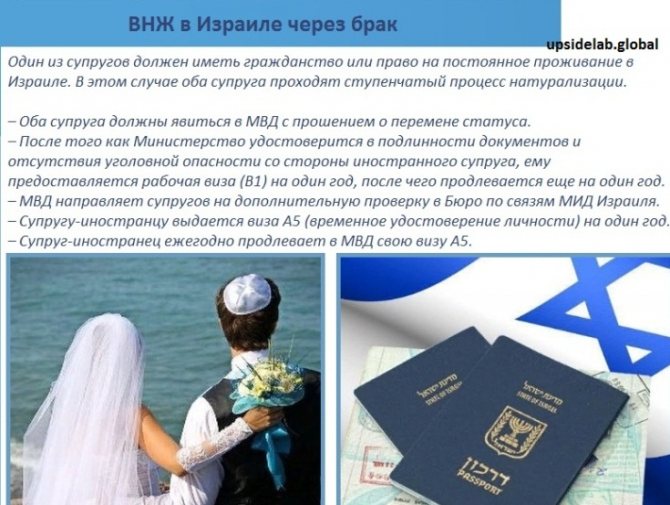What does a residence permit in Israel give?
Russia and Israel signed an agreement, thanks to which tourists can cross borders and stay in the country for about 90 days out of six months. Those who plan to stay will have to apply for a visa of the appropriate type or obtain a residence permit to Israel. The permit is issued taking into account the basis for different periods:
- 3 years – temporary residence in the country;
- 5 years – transitional residence;
- without time limits - permanent residence.
Holders of Israeli residence permits have the same rights as local citizens, but cannot vote in elections or hold certain positions in government agencies.
Important! Having real estate and opening a business does not give you the right to apply for permits.
Having a residence permit, a foreigner receives a number of advantages:
- security, excluding conflict zones;
- ecological attractiveness, healing climate;
- democratic society;
- compliance with laws;
- high quality of life;
- developed infrastructure;
- social support;
- high level of culture and education;
- abundance of resorts;
- developed medicine;
- the friendliness of the local people.
In addition to the advantages, as in any other country, you can also find disadvantages in Israel. These are the risk of terrorist attacks, inconvenience due to increased security measures for citizens, hot summers, expensive real estate, and the country’s isolation from other states. Other factors are the need to work hard to earn a good living, as well as the influence of religion on all aspects of life and the compulsory study of Hebrew.
Parents of an Israeli resident
There are several more ways for a non-Jew to obtain a residence permit in Israel. A resident of Israel can bring his parents of retirement age to the country, but for this several conditions must be met:
- the parent has no other children living outside Israel;
- The mother must be over 65 years old, the father over 67;
- The relationship with the inviting child is constantly maintained, despite living in different countries.
The conditions are quite harsh. If there is another child, it will be extremely difficult to obtain permission. It does not matter to the authorities whether another child provides assistance or not. Even if there is an incapacitated relative, the parents are considered not single, and entry is prohibited.
The issue can be resolved through the court by presenting evidence that only this child cares about his parents. It should be understood that the legal status in Israel of the inviter himself will be checked, so if there is something unclear there, it is better not to risk it.
Initially, the parent receives a work visa to Israel for a period of 2 years.
For the next 2 years, a temporary residence permit is issued, and only then a full-fledged residence permit is issued.
Methods and reasons for obtaining
According to OECD statistics, the number of people living in the country but born abroad is approximately 25%. Every fourth local resident is a foreigner. The total number of emigrants in 2021 was more than 2 million people. The Bureau of Statistics provides data for 2018: 37 thousand immigrants were accepted, of which 27% were Russians, 25% Ukrainians, 13% French, 10% Americans, the rest were immigrants from other countries.
Israel, unlike other countries, does not guarantee obtaining a residence permit when purchasing real estate or receiving education at local universities.
More than 80% of applicants for residence permits arrived under the repatriation program, followed by employment in the number of applications. Those who plan to contact the authorities must meet a number of requirements:
- no criminal record and no intention to participate in terrorist attacks against Israel;
- availability of grounds for legalization;
- fixed income;
- insurance policy;
- absence of diseases dangerous to society.
Each candidate will have to undergo strict verification, so trying to deceive the authorities is not worth it. If the issue is resolved positively in favor of obtaining a residence permit, Israel will become a second homeland with special conditions for relocation, adaptation and support from the state. All that remains is to visit the country visa-free to get acquainted with the climate and culture, then choose one of the most suitable reasons for moving.

Repatriation
One of the simplest and most reliable ways to obtain a residence permit in Israel. The program is intended for people with Jewish roots and a desire to live in their historical homeland. For their fellow citizens, the authorities have developed a special project that provides support for 6 to 12 months from the date of relocation. Help includes:
- health insurance;
- compensation for the cost of air tickets or their purchase;
- free Hebrew education;
- support in finding real estate for rent;
- assistance in employment.
Applicants must provide proof of Jewish ancestry. This could be a birth certificate (your own or that of your parents, grandparents), extracts from synagogue books, family photographs and other documents that can confirm membership in the Jewish nation. All supporting certificates are checked; forgery is fraught with refusal of legalization and a ban on visiting the country even as a tourist. If the application is approved, a residence permit is issued.
Family reunification
Israel considers Russian relatives who want to move in with Jews living in the country to be another category deserving a residence permit. According to local laws, kinship is recognized up to the 4th generation inclusive. Therefore, children and parents of Israeli residents, as well as their grandchildren and even great-grandchildren, can move. The condition is to provide documentary evidence of relationship.
This can be done by finding papers with Jewish ancestors in the archives, or by donating DNA. The second option is expensive, but is 100% proof of belonging to the Jewish nation. The test is carried out in Israel, since results from laboratories in other countries are not accepted for consideration.
Marriage registration
Before you plan to marry a resident of Israel, you need to take into account that fictitious marriages are strictly punished here. Authorities carefully check documents of Russian applicants confirming the existence of a relationship before and after registration. Newlyweds are monitored by regulatory authorities for a certain period (the first few years after marriage). After approximately 7 years of being legally married, the authorities are convinced that the spouses have a common household and finances, and that the couple is real. The candidate will have to prepare a number of documents, wait for verification by the Ministry of Internal Affairs and then receive the appropriate residence permit.
Refugee
As in other countries, only those who can prove that they need protection and could not find it in their homeland can obtain refugee status. It will be difficult for the Russians to convince the Israeli authorities that their lives were subject to serious threats at home, since Russia is not listed as a potentially dangerous country. But if religion, belonging to minorities and other grounds have strong evidence and convince the authorities, after 1 year of reviewing the papers, they can provide the desired status and related support. While the document review process is underway, a foreigner can legally live in the territory of the Israeli state and get a job.
Employment
Compared to refugee, this is a more realistic opportunity for Russians to move to Israel. This option is suitable for those looking for long-term work. It's difficult to find a vacancy. The influx of labor resources from the Russian Federation is large, since there are attractive salaries, a warm climate and a lot of opportunities.

The main stages of legalization are to find a vacancy, apply for a work visa and move to Israel. Vacancies should be looked for on thematic sites on the Internet (in Hebrew, English), with the help of recruitment agencies (specializing in service workers and unskilled workers), through relatives and friends in Israel.
The authorities issue work visas upon requests from employers. A company that has entered into an employment contract with a foreigner sends an application to the Israeli Ministry of Internal Affairs. There are certain rules. The employer must convince government employees that he really needs a foreign specialist for a certain position. Review of the application takes about 20 days. If the decision is positive, the specialist submits documents to the consulate in Russia and issues a work visa based on an employment contract. The visa is issued for 1 year with the possibility of extension.
An important point is that if a specialist decides to change his place of work, he will have to fill out all the paperwork again, but not in Russia, but go through the procedure in Israel. Work is permitted only in the area for which a previously issued permit. Or you will have to contact the authorities and adjust your plans.
Residence permit in Israel: how to get it
Israel attracts with its amazing history, a unique combination of three world religions and the colorful landscapes of the Mediterranean coast. In addition, the Holy Land is included in the list of the most successful countries in the world in various indicators of quality of life. Often this is the decisive argument for immigration for people from different parts of the world.
Most foreigners who plan to move to this country are actually returning to historical lands. People with Jewish roots can obtain citizenship, and for some categories of people there are special repatriation programs that make it possible to obtain a residence permit in Israel. However, even if a resident of another country does not have Jewish relatives, he can apply for full inclusion in the Jewish nation, only in this case the process will be quite long and complicated.
Despite all the nuances of obtaining Jewish citizenship, the rewards for those who can complete this procedure will be worth all the effort.
Residents of Israel truly receive comprehensive government assistance, the opportunity to study at the best universities in the country, find well-paid and promising jobs, and receive a full package of social guarantees.
Residence permit in Israel
A short stay in Israel is possible for residents of the Russian Federation without obtaining special documents. A visa-free regime between countries allows you to freely cross the border of the Holy Land and stay on its territory for no more than 90 days within 6 months. If a foreigner is planning a longer trip, he needs a long-term visa - an analogue of the “residence permit” familiar to Russians. This document gives the right to stay in the country longer than the period of a visa-free visit, but it does not allow you to enjoy all the privileges of a citizen of the Promised Land.
Apply for citizenship
Unlike a residence permit, long-term visas in Israel are divided into several types according to the purpose of a long stay in the country:
● Temporary (type A/1). This document is issued only to those foreigners who have legal grounds for obtaining citizenship, but there are doubts about the correctness of such a decision. A temporary residence permit helps determine how comfortable a person is in the country and whether he is ready to become part of the Jewish nation. Type A/1 visa is issued for a period of up to 3 years. It is understood that during this time a person must draw appropriate conclusions for himself in order to decide to move or abandon this idea.
● Student (type A/2). Represents the official basis for residence in Israel during the entire period of study at the university. To obtain this type of residence permit, you need a certificate of admission to a university, as well as all the documents that are required to obtain a visa. In addition, the Israeli government assumes a certain responsibility for each student, therefore, in order to obtain a student visa, it is necessary to provide evidence of sufficient financial security: this guarantees the ability of a new resident of Israel to independently solve their financial problems during the period of study.
FAQ
How to obtain a residence permit in Israel?
For Jews, the procedure for obtaining a residence permit is simplified by the presence of the Law of Return. Others can obtain a residence permit in one of the following ways: marriage with a Jew/Jew, family reunification, work visa, refugee status.
What does a residence permit in Israel provide?
A residence permit provides the opportunity to officially work in Israel, access to medical care, as well as to receiving benefits upon reaching a certain age.
● Clergy visa (type A/3). This document assumes a special religious mission. It is issued to representatives of different religious denominations who come to the Promised Land to conduct or undergo appropriate religious procedures.
● Visa for families with children (type A/4). This document is required for the spouse and child if an A/2 or A/3 visa was issued in the name of the second member of the married couple.
● General purpose (type A/5). This version of the document is also called a “temporary resident visa”. You can get it if one of the spouses of a mixed couple moves. Temporary residence in the territory of the Holy Land for a representative of a foreign state is possible for a period of 1 year, after which spouses must annually confirm their cohabitation and renew the permit. Such a system was developed in order to control how genuine the marriage is. This prevents the registration of fictitious alliances and other methods of falsifying documents.
● Working (type B/1). This type of temporary work visa is granted to every foreigner if he has arrived in the Promised Land to perform temporary hired work.
Features of the B/1 visa
This document allows a foreigner who has been accepted into a new organization or transferred to another department to work in Israel to stay in the country for a long time. However, visas are not issued to all foreign citizens. To obtain a document, you need to go through a number of bureaucratic procedures in Israeli government organizations.
To justify the need for an employee to move from another country, the employer must not only fill out an application in the prescribed form, but also be ready to personally provide arguments why this particular employee is unique, and for what reasons he cannot be replaced by a resident of Israel.
Residence permit status gives the right to officially work and claim benefits in old age at the place of residence
Also, this type of visa is issued to spouses without Jewish blood in the family as a temporary step before receiving an A/5 visa and permanent residence permit.
Obtaining a permanent residence permit
Theoretically, in the Holy Land it is possible to obtain permanent resident status on the basis of a long-term visa. This is evidenced by certain clauses of the Law of Return, the Law of Entry into Israel and the Law of Foreign Workers. However, according to lawyers, this is very difficult to do in practice: in the vast majority of cases, after the expiration of a temporary visa, a person is obliged to leave the country. In reality, this status can only be obtained by foreign spouses in mixed couples as a temporary step in the five-year citizenship procedure.
Advantages of obtaining a residence permit in Israel
Although the rights of a temporary resident of Israel differ from those of a resident, obtaining a long-term visa opens up new opportunities for a foreigner: access to the renowned high level of medical care, social guarantees, quality education and new horizons for business development. The residence permit status gives the right to officially work and claim an old-age benefit at the place of residence, which is necessarily paid upon reaching a certain age, subject to two years of residence in the country.
A residence permit is assigned by the authorized body in Israel – the Ministry of Internal Affairs. The visa is valid for 1 year, after which the document must be renewed at the Israeli Ministry of Internal Affairs.
The main difference between a residence permit and the status of a citizen is the lack of the opportunity to work in government agencies, as well as vote in elections and hold elected positions.
How to get a residence permit?
The main difference between a residence permit and the status of a citizen is the lack of the opportunity to work in government agencies, as well as vote in elections and hold elected positions.
If for Jews the procedure for obtaining a residence permit is simplified in accordance with the “Law on Repatriation,” then for foreigners without Jewish blood the process of obtaining a residence permit in Israel is somewhat more complicated.
The main ways a person can use in this situation:
1. Family reunion. If at least one relative of a foreign citizen is Israeli or has permanent resident status, you can apply for a residence permit due to the need to move to a family member who requires special care. In this case, a work visa of category B/1 is initially issued, after which the visa can be changed to category A/5 with the prospect of obtaining permanent residence.
2. Work visa. If a resident of another country works for an Israeli company on a B/1 visa, he can obtain a residence permit for a period of 1 year with subsequent extension.
3. Refugee status. Another difficult way to obtain a residence permit is to obtain refugee status. It is possible if none of the relatives have Jewish roots, and the foreigner is in real danger in his homeland. The Israeli Refugee Authority deals with such issues. To formalize the documents, you need to prove the existence of a threat to life, as well as the refusal of the authorities of your own country to help. Unfortunately, running business projects or purchasing real estate does not in any way affect the official registration of documents for permanent residence in Israel.
Tips for migrants
Please note that information stated during an interview at the Ministry of Internal Affairs can only be refuted in court. Therefore, it is important to find out in advance how to obtain a residence permit in Israel. It’s easier to do this by trusting specialists in the field of Israeli migration law.
Validity period of the residence permit
The period during which the permit to live in Israel is valid depends on the reason for moving:
- repatriation. The document is valid for 5 years. For minors - indefinitely. The rest extend their residence permit in the manner prescribed by law, and after a while they apply for citizenship. If a repatriate is absent from the country for more than 7 years, he is deprived of his status;
- marriage. Gives the right to live and work. The residence permit is renewed annually, and after 5 years you can apply for citizenship;
- refugee. While the submitted documents are being studied, they will issue a temporary permit for employment, and if the status is approved, they will be allowed to immediately collect documents for a citizen’s passport.
How to get a residence permit if you are not a Jew
A residence permit can also be obtained by those who do not have Jewish roots, but want to live in Israel.
| Name of the method of obtaining a residence permit | Conditions | Deadlines |
| Marriage to a Jew or Israeli citizen | After the wedding, the newlyweds undergo a naturalization procedure. It implies proof of the naturalness of the marriage. | The spouse who applies for a residence permit receives permission to work and live in the territory of the Middle Eastern state in the first year. For 2 years, a citizen has the right to obtain a residence permit, but only for 12 months, which is renewed annually for four years. Only 6 years from the date of official marriage a person receives a permanent residence permit. |
| Having children who have Israeli citizenship | If a son or daughter lives in Israel, their parent has the right to apply for a residence permit. A prerequisite is that the parent must be at least 65 years old (for a woman) and 67 years old (for a man), have no other children living in the country with him, and maintain close family ties with a child from Israel. | After confirmation of all points, the parent is issued a visa for the following period:
After the expiration of the specified period, the parent is issued a temporary residence permit for a period of 2 years, after which a residence permit is issued on a permanent basis. |
Russians can also obtain a residence permit through naturalization, that is, through gradual entry into Israeli society. A citizen is obliged:
- Have resided in a Middle Eastern country for at least three years after applying for status as a spouse or parent.
- Residence in the country at the time of obtaining citizenship.
- Permanent residence in the country and intention to remain there.
- Availability of property, income or business in Israel.
- Fluent in Hebrew.
- Renunciation of citizenship of another state.
The person will definitely need to prove that his intentions (parent or spouse) are not fictitious and provide the required information, which implies the following:
- correspondence with relatives or close people, with the obligatory indication of dates and signatures, which must be written in Hebrew, postcards are also suitable;
- photographs from the family archive confirming connections with these individuals;
- printouts of telephone calls, bills from restaurants and hotels;
- plane tickets or spending time together, as well as bills confirming joint residence;
- evidence that will confirm a close relationship (for married couples).
What documents are needed
On forums for immigrants, former compatriots recommend preparing more documents so that the set of papers is as informative as possible. This increases the chances of getting your application approved. If you have Jewish roots, it is advisable to capture letters and photographs from family archives. The originals are provided to the consulate, as copies are not accepted.
Recommendation: It is advisable to translate existing documents into English or Hebrew in advance.
A standard package of documents is drawn up by the candidate taking into account the grounds for moving to the country. Lists can be checked on the website of the consulate or migration office. Candidates are required to:
- questionnaire;
- military ID;
- international passport;
- certificate of good conduct;
- marriage/divorce certificate;
- photos;
- insurance policy;
- confirmation of the basis (invitation from the university, contract with the employer, documents of Jewish relatives);
- confirmation of sufficient financial security.

Repatriation is the main method of emigration to Israel
There are several ways to move to Israel for permanent residence. One such method is the “Law of Return.” According to this law, an immigrant must prove that he belongs to the Jewish people. This law was adopted immediately after the declaration of Israeli Independence in 1950.
According to the Law of Return, citizens who have Jewish roots and want to reunite with their people can claim some preferences. Firstly, they are entitled to compensation for the costs of purchasing air tickets. Secondly, immigrants who choose this method can count on financial assistance from the state upon arrival. Thirdly, the state will also provide the opportunity to take a free Hebrew course. Finally, under the Law of Return, immigrants can take retraining courses free of charge.
But in order to take advantage of such preferences, an immigrant must prove that there are relatives in his family tree who are immigrants from Israel. And here certain difficulties may arise. According to the law, Jews on their mother's side must prove that they have not converted to another religion. As a last resort, an immigrant can convert to Judaism. However, you should know that the procedure for accepting Judaism is quite complex and lengthy. A person who wants to immigrate to Israel will have to almost completely reconsider his way of life, give up some habits, and also submit to a variety of prohibitions and taboos.
The repatriation procedure consists of several stages. At the first stage, a person wishing to immigrate to Israel for permanent residence must provide documents proving their belonging to the Jewish people. In addition, a person planning to travel to Israel must fill out all necessary forms and declarations.

After checking the documents, the immigrant will have a conversation with the Consul. In some cases, Consuls conduct on-site interviews. This option is possible if the Israeli Consulate receives a large number of applications for repatriation from one city. You can always find out about upcoming exit interviews on the official website of the Israeli consulate in the country of residence of the potential repatriate.
After passing through the Consulate, the immigrant will receive a stamp in his passport “departure for permanent residence.” Then there is only one small matter left to do: the immigrant needs to obtain a visa and purchase air tickets.
Separately, it is worth mentioning the process of filling out the questionnaire. One of the items in this questionnaire is the question “Your religion.” If the immigrant does not belong to the Jewish faith, he should indicate “not a believer.” This is because answering “Muslim” or “Christian” will mean converting to another religion. Accordingly, the Israeli Consulate will have a compelling reason to refuse immigration for permanent residence.
Required documents for immigration to Israel
Those wishing to travel for permanent residence to Israel under the “Law of Return” must provide the following documents:
- all available passports;
- color photo 3*4 cm;
- a foreign passport that does not expire within 6 months after receiving the visa;
- birth certificate (including parents);
- marriage certificate of parents and grandparents of Jewish parents;
- birth certificate of a Jewish relative;
- military ID;
- employment history;
- educational documents;
- Identity documents for relatives living in Israel.
Cost and processing time
Government officials review documents for about 1–3 months. Sometimes the deadlines are delayed taking into account the workload of the migration service and the category of the applicant. If the decision is positive, a residence permit is issued. After 4 years of residence in this status, you can apply for a permanent residence permit. The holder of permanent residence is equal in rights to local residents, excluding the right to vote and employment in government agencies.
Important: dual citizenship is not allowed in Israel. Those wishing to retain Russian citizenship are given the opportunity to remain in the country with a residence permit.
When submitting documents in person, the cost of the state fee is about 43 euros. Translation of papers is additionally paid. If you turn to intermediaries for help, the amount will increase significantly, but the number of errors will decrease.
Obtaining visas to Israel
Specifically for Russians, there are benefits and preferences only for visiting Israel during tourist trips and trips to relatives. In these cases, they have a visa-free regime for 90 days. A visa is required if the trip is related to study, accommodation and employment.
Visas are issued in the following cases:
- work visa, issued at the invitation of the employer;
- The visa for volunteers and clergy representatives is issued for a period of six months with the right to extension. To receive it, you need an invitation from the organization;
- visas are also issued to refugees and people with certain personal circumstances for humanitarian purposes
Having a visa in hand, a person can live in Israel for a certain period of time, limited by the visa.
What to do if you receive a refusal
The country's authorities carefully study the documents of candidates for a residence permit, and in certain cases they refuse the application. Causes:
- having a criminal record or mental illness;
- change of religion by a halakhic Jew;
- there is insufficient evidence of Jewish roots;
- incomplete set of papers, etc.
Having received a refusal, you can try to challenge the decision in the Supreme Court of Israel.
Obtaining a residence permit is not an easy task for those who do not have Jewish roots. If the goals are serious, then achieving the desired result is possible. According to 2021 statistics, the number of Russian-speaking citizens in Israel has reached 1 million. There are diasporas in large cities that help immigrants from the Russian Federation settle in place and integrate into society. Young people manage to save up for a comfortable old age, pensioners from Russia receive subsidies from the state. Citizens of the country enjoy high-quality medical services and have unlimited access to the healing gifts of local nature.
Reasons for immigrating to Israel
Israel occupies leading positions in all possible ratings. This country has the lowest child mortality rate in the world. Israel is the leader in the number of computers per capita. Most importantly, this country is a recognized leader in the field of medicine. This is where advanced techniques for treating the most complex diseases are used. A high level of medical care was achieved through solid financial support from the state.

Over the past few years, the Israeli government has been actively fighting corruption. Thanks to this, there is a decrease in the level of corruption in the country. Today in Israel everything is done according to the law, from opening your own business to receiving quality medical care. Thanks to such government actions, the lives of ordinary people are greatly simplified.
Security is another reason why many decide to take such a step as immigrating to Israel. There is an extremely low crime rate here. In any city in the country, children can walk safely even at night. A similar level of security was achieved as part of Israel's fight against terrorist threats.
Other reasons for the popularity of this area of immigration include high-quality medicine. Israeli doctors are considered among the best in the world. This fact is due to the ability to access advanced technologies. This is where the most complex operations are performed and this is where people from all over the world go for treatment. One has only to say that at the moment life expectancy in Israel is just over 80 years.
The desire to immigrate to Israel may be caused by other reasons:
- warm climate and environmental well-being;
- modern education system;
- high salaries;
- pension provision;
- developed infrastructure;
- high cultural level;
- peacefulness and tolerance of local residents.
Immigration rate to Israel
Over the past few years, the rate of immigration of ethnic Jews to Israel has increased by more than 40%. According to statistics, the majority of immigrants are Russians and Ukrainians.
In the first quarter of this year, more than 6 thousand ethnic Jews emigrated to the “Promised Land”. Just under a third of the immigrants heading to Israel this year are Ukrainian. It is worth noting that over the past few years the flow of emigrants from this country to Israel has been steadily growing. At the beginning of this year, just over one and a half thousand emigrants from Russia moved to Israel. France ranks third in terms of the number of immigrants to Israel. The main reason for the emigration of Jews is the anti-Semitic sentiments that have been observed in France over the past few years.
Who can apply for a residence permit
The easiest way to obtain permanent residence and citizenship is for persons falling under the Law of Return. Its effect applies only to people who can prove their Jewish origin or who have converted to Judaism. All other foreigners can immigrate to Israel on the basis of:
- Law “On Entry into Israel” (1952).
- Law “On Foreign Workers” (1991).
Based on these regulations, non-Jewish foreigners can apply for a temporary residence permit in Israel and permanent residence in the following cases:
- Receiving an invitation to work from an Israeli company (entry work visa B/1 is issued).
- Admission to study at a university (student visa A/2).
- Invitation as a rabbi or his student to study the Holy Scriptures of the Jewish religion (clergy visa A/3).
- Marrying an ethnic Jew.
- Natural naturalization.
- Relocation of elderly parents of a person who has received the status of an Israeli citizen.
A separate category of citizens should include those who can obtain Israeli citizenship for humanitarian reasons. These are persons who have received refugee status, people who came to the country for treatment of serious illnesses, foreigners taking part in volunteer programs.
An exception is made for those persons whose professional level is of interest to the country. The same requirement applies to students. The most realistic way for non-Jews to obtain citizenship is through marriage or the process of naturalization.
What may be the grounds for obtaining a residence permit?
Not everyone can obtain an Israeli residence permit. To draw up a document, you must have good reasons, which we will talk about.
What a foreigner should know
In order to obtain a residence permit, an immigrant must:
- Apply for a residence permit;
- Have with you the originals of all documents required for registration, translated into Hebrew and drawn up in accordance with the standards established in the republic;
- Pass an interview (if necessary);
- Confirm payment of all fees in the prescribed amount;
- Provide evidence of the existence of grounds for issuing a residence permit.
The methods and at the same time the grounds for obtaining a residence permit in Israel are:
- Obtaining a B/1 work visa, issued with an invitation from the employing employer;
- Entering into a marriage with a Jew;
- The applicant’s acceptance of Judaism and proof of the veracity of his true desire to practice this religion (in this case, one can immediately apply for citizenship);
- Legalization of elderly parents if the children have Israeli citizenship (again, you can try to immediately obtain citizenship);
- Birth or adoption of a child;
- Refugee and seeking political asylum;
- Special services to the State of Israel;
- A number of cases considered on an individual basis.
Marriage and family
For a person of non-Jewish nationality, one of the ways to obtain a residence permit is to marry an Israeli citizen or someone who already has a residence permit in the country.
Immediately after receiving the marriage registration certificate, the foreign spouse can begin collecting documents for obtaining a residence permit.
Note! In Israel, it is impossible for persons who do not profess Judaism to officially marry. Therefore, this method of obtaining a residence permit is definitely not suitable for “infidels”.

Residence permit and marriage
Business immigration
Currently, Israeli legislation does not have the concept of business for investment. Investments in the economy or real estate are rather one of the reasons to settle in the country as a permanent resident.
This significantly distinguishes the state from other EU member states, in which residence permits and even citizenship by investment are extremely common.
But this does not at all indicate that doing business in the country is unprofitable. Everything is exactly the opposite: opening a business in the country can bring significant income to the owner, especially taking into account the opening prospects in the vastness of the European Union.
Attention! Investors and businessmen can obtain a residence permit on a general basis if they do not fall under the category of privileged foreigners (repatriates, for example).

Popular destinations in Israel
Repatriation
Returning to a person’s home country after being forced to move to another state and losing citizenship is called repatriation. In Israel, the procedure is regulated by the Law of Return.
Repatriates include the following categories of citizens:
- Children and grandchildren of Jews;
- Spouses and widows of Israelis;
- Spouses, widows (widowers) of children of Jewish citizens;
- Spouses, widows (widowers) of grandchildren of Jews;
- Those who were adopted by Jews, their children or grandchildren;
- Converted to Judaism.
The reasons for refusal of repatriation are as follows:
- Criminal history;
- The presence of a psychiatric or acute infectious disease;
- Absence or incomplete availability of the required package of documents;
- Inability to provide proof of Jewish roots;
- Conversion to another religion.
You can challenge the refusal by contacting the Supreme Court of Israel.
Note! A number of benefits are provided for repatriates, including financial government assistance, provision of temporary housing, travel expenses, assistance in employment, education, and much more. This category of Jews receives a passport at the airport upon arrival in the country. That is, repatriates do not need to obtain a residence permit at all.
Getting an education and employment
Those who are studying at Israeli universities or have an official place of work can count on obtaining a residence permit. The former confirm the fact of training with a corresponding certificate from the university, the latter - with a copy of the agreement with the Employer.
Repatriation
The simplest and most effective option. If a Ukrainian, Belarusian or any other resident of the CIS proves that he had Jews in his ancestors, he will be allowed to stay in the country and receive a residence permit.
This method has certain features:
- kinship must pass through the maternal line;
- members of his family can come to the country with the person;
- All visitors must be converted to Judaism before arriving.
In order to obtain the appropriate status, a person must collect all documents confirming his origin and deliver them to the nearest Israeli consulate. There, these papers will be examined, and if the person or members of his family do not pose a threat to national security and have not previously been convicted of particularly serious crimes, pure formalities will remain. It is worth remembering that consular officers have the right to conduct their own investigations, conduct interviews with future residents of their country, and ask clarifying questions, in particular about the purpose of immigration. If they do not receive answers, the move will not be possible.
Attention! Repatriation can also take place on Israeli territory. To do this, you just need to fly to Israel as a tourist (it is issued freely for 90 days) and personally submit the appropriate application to the local office of the Ministry of Internal Affairs.
For families that have successfully completed the investigation and interview, Israeli representatives will have a little financial assistance and feasible support in store for the first time. If necessary, country representatives will help you choose a plane ticket, organize travel, and tell you exactly where it is best to buy food and educate children. In a short time, newly arrived citizens of Israel will be told everything that an ordinary Jew should know.










